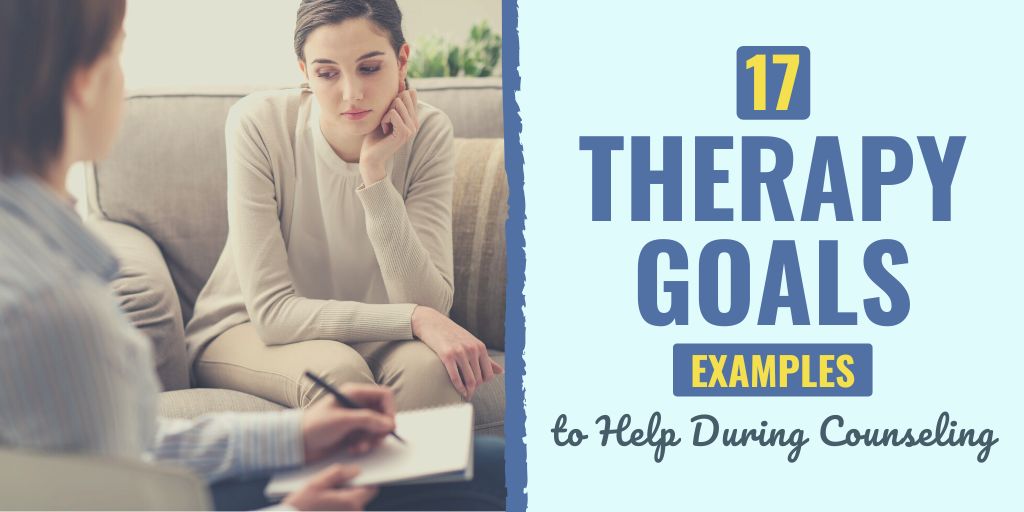Starting therapy for the first time can be a bit scary, especially if you're not sure what to expect. To help ease your worries and get the most out of counseling, it's important to set realistic goals for yourself.
In this article, we'll take a look at some easy and achievable examples of therapy goals that can be used during counseling sessions. Use these goals to help monitor your progress and make sure you're getting the most out of your counseling sessions.
What are Therapy Goals?
Also known as patient-driven goals, therapy goals are objectives that are set by the patient and therapist to create specific outcomes and results in therapy. Some therapy goals can be short-term goals, which typically focus on managing mental health issues in the present, or long-term goals that focus on developing healthier coping mechanisms and behaviors for a better quality of life in the future.
While you might be hesitant to set goals for yourself, or be a bit lost or confused, there are many benefits to setting therapy goals. Studies have shown that setting goals can help motivate and encourage you to stay focused on your progress, as well as provide a sense of relief and accomplishment after completing them.
Below are some therapy goals you can try out for yourself if you're in need of extra motivation, direction, and guidance throughout your counseling sessions. These apply to various types of diagnoses and not all of them will apply to you.
Choose the ones you feel will be most helpful for your situation and discuss integrating the idea into therapy with your counselor.
17 Therapy Goal Examples
1. Practice Positive Affirmations
One of the best goals to implement during counseling sessions is to practice positive affirmations. Positive affirmations are statements that can be used to promote positive thinking and self-confidence in individuals.
These statements don't necessarily have to be complex; but can be useful reminders of self-worth, personal accomplishments, and successes. Regularly repeating positive affirmations can help to build a sense of self-confidence and empowerment, as well as reduce stress and anxiety.
For people with low self-esteem or a generally negative outlook, repeating positive affirmations can be a great way to start seeing the glass half-full, and is one of the easiest goals to achieve outside of therapy. The best part is it can work for almost any counseling situation.
2. Identifying Emotions
Another great therapy goal is to learn how to identify and process your emotions. It's important to understand that feelings come and go… and recognizing them is the first step to learning how to cope with them.

Learning how to identify emotions can also help you to understand why you may be feeling a certain way, and how to address the underlying issues associated with them. Doing this can lead to increased self-awareness, better decision making, and improved relationships.
To help identify emotions, some examples of therapy goals include:
3. Learn to Self-Soothe
Self-soothing is a great goal to focus on during therapy, as it promotes healthy coping mechanisms and techniques for managing stress. However, some people don't have the healthiest self-soothing behaviors, which can make it difficult for them to regulate emotions outside of counseling sessions.
Your counselor might want you to find a healthier way to self-soothe, such as by taking a walk or listening to relaxing music. Other examples of therapy goals could include trying out simple breathing exercises, practicing mindfulness, and engaging in activities that bring joy or relaxation.
By doing this, you can learn how to better manage your stress and emotions when things get tough.
4. Be Vulnerable
Attending counseling can be scary, as it often means being vulnerable and discussing things that can be difficult to talk about. But vulnerability is important, as it's a key part of personal growth and healing.
Although it might be uncomfortable at first, allowing yourself to open up can help you gain insight into your emotions, as well as provide a sense of relief when it comes to getting things off your chest. Practicing vulnerability can also be a great goal to focus on during therapy, as it can help you to feel safe and supported, as well as empowered and understood.
To work on being vulnerable during counseling sessions, some examples of therapy goals include discussing difficult topics, asking for help when needed, and expressing your thoughts and feelings openly.
5. Creating a Support System
Having a counselor is a great resource for mental health support. However, you will need to eventually create a support system outside of your therapist's office. For people who are new to therapy, or those with limited social connections, building a support system can be difficult.

To help in this process, some examples include joining support groups, creating positive relationships with peers, and finding activities to do outside of counseling sessions. By doing this, you can create a system of support to help you through difficult times, as well as celebrate successes and accomplishments.
6. Creating Boundaries
The ability to create and maintain boundaries is essential for a healthy lifestyle. It's important to be able to set limits on what you will and won't tolerate, such as how much time you will spend with certain people, and what topics are off-limits for conversation.
Creating boundaries can help protect your mental health, and it can also help you feel empowered. If your counselor suggests creating boundaries, he or she might want to see you do things such as practice saying “no”, remove yourself from negative environments or relationships, and honor your own needs and wants.
Doing this can help you gain a sense of control over your life, as well as give you the space to live authentically and prioritize self-care.
7. Facing One Fear
Unfortunately, many people mistakenly believe that the solution to anxiety is avoiding fears at all costs. However, avoidance might serve to strengthen the anxiety and make it harder to cope in the long run. A great therapy goal is to face one fear at a time, as this can help you gain confidence and learn how to manage anxiety in situations that cause distress.
To do this, your therapist might suggest things like writing down fears or taking small steps towards conquering them. It's important to remember that facing fears does not have to mean facing them all at once; take things slow and steady and be sure to reward yourself for successes along the way.
8. Developing Self-Compassion
Self-compassion is essential for mental health wellness, as it allows people to embrace their flaws without judgment or criticism. Unfortunately, many of us struggle with self-criticism more than we'd like to admit.
To help in this process, your therapist might suggest things like learning to forgive yourself for mistakes, accepting and embracing imperfections, and understanding that everyone makes mistakes. By doing this, you can learn how to be kinder towards yourself and focus on the positive aspects of life.
9. Learning to View Your Therapist as an Ally
For many of us, the idea of therapy can be intimidating. It's important to remember that your therapist is not there to judge you or criticize you, but rather as a source of support and understanding. To help build a healthy relationship with your therapist, you can:
By doing this, it will become easier to view your therapist as an ally who is on your side and wants nothing more than for you to reach your mental health goals.
10. Building Positive Habits
One of the best therapy goals is to build positive habits. This can include anything from creating healthier eating habits, getting more sleep, or engaging in activities that bring joy and fulfillment.

It's important to remember that these changes don't have to take place overnight; it takes time and effort to make lasting change. Your therapist might also suggest things like tracking progress, setting small achievable goals, and rewarding yourself for successes. By doing this, you can gradually replace negative habits with positive ones that help improve your mental health.
11. Developing Healthy Coping Skills
In the face of stress or anxiety, it's easy to resort back to unhealthy coping skills such as avoidance or self-medication. However, these methods rarely bring lasting relief and can even make mental health issues worse over time.
To help in this process, your therapist might suggest things like learning breathing exercises or mindfulness techniques, engaging in physical activity, and talking to a trusted friend or family member when feeling overwhelmed. Developing healthy coping skills can help you manage difficult emotions in more productive ways.
12. Reframing Negative Thoughts
During CBT, your therapist might suggest reframing negative thoughts in order to help manage your emotions. This can include things like looking at situations from a different perspective, questioning negative assumptions, or challenging irrational beliefs that don't serve you.
By doing this, it will become easier to think more positively and focus on the good aspects of life rather than getting stuck in an unhelpful thought cycle. Unfortunately, many people struggle with cognitive distortions that can create false illusions, such as “I'm not good enough” or “I can't do it.” Reframing these thoughts will help you break free from the cycle and focus on a more positive outlook.
13. Achieving Sobriety Milestones
If you're in substance abuse counseling or treatment, then achieving sobriety milestones is an important goal. This could include anything from attending meetings, taking part in sober activities, or developing the skills to resist cravings and triggers.
Your therapist might suggest things like creating a relapse prevention plan, setting up a support network of friends and family members, or engaging in mental health treatment such as therapy or medication.
By creating measurable goals and tracking your progress, you can learn to recognize the signs of relapse early and take proactive steps to avoid a return to substance abuse.
14. Following Your Suicide Prevention Plan
Suicide prevention plans are vital in helping someone manage suicidal ideation. Your therapist might suggest things like avoiding triggers, seeking out positive influences, and participating in activities that bring joy and fulfillment. It can also be helpful to develop a safety plan that outlines what to do or who to contact if thoughts of suicide become unbearable.
Lastly, your therapist might suggest creating a support network of family and friends who can offer emotional and practical help in times of need. Following your suicide prevention plan is essential for managing suicidal thoughts and staying safe. One of the biggest goals you can achieve is turning to your suicide prevention plan and finding the courage to reach out for help.
15. Gaining Insight Into Yourself
When it comes to mental health, gaining insight into yourself is one of the most important therapy goals. This can include anything from understanding your values and beliefs to recognizing what triggers your emotions.

By taking the time to reflect on yourself and your experiences, it will become easier to identify patterns and make changes where needed. Additionally, your therapist might suggest creating a self-care plan that includes activities or practices to help you step back and take care of yourself. Ultimately, gaining insight into yourself is a valuable goal that can help you make more mindful decisions in the future.
16. Improving Communication Skills
For many people, communication is difficult. This can be especially true if you're in a relationship or have been through trauma. Working with your therapist to improve communication skills is a great way to increase your emotional intelligence and build stronger connections with others.
This could include anything from learning how to listen better, expressing yourself clearly, or using body language and facial expressions to communicate. Improving communication skills will help you build more meaningful relationships and express yourself in a healthy way.
17. Achieving a Goal at School Or Work
For many people, therapy is just one aspect of their overall goal setting. Achieving a goal at school or work, such as getting better grades, landing a promotion, or completing a project, is an important way to boost your self-confidence and sense of accomplishment.
Your therapist might suggest creating a plan that outlines what you need to do and setting measurable benchmarks for progress. Achieving a goal at school or work is an important part of personal growth and can help you gain new skills and experiences.
Final Thoughts on Examples of Therapy Goals
These are just a few examples of therapy goals that counselors may suggest. It's important to remember that there is no one-size-fits-all approach when it comes to counseling. Each person will have unique needs and challenges to consider.
However, by identifying goals for yourself and working with your counselor to reach them, you can make great strides in improving your mental health and overall wellbeing. With patience and dedication to self-care, you can find success on your own that lasts for a lifetime!
Finally, if you want to take your goal-setting efforts to the next level, check out this FREE printable worksheet and a step-by-step process that will help you set effective SMART goals.


